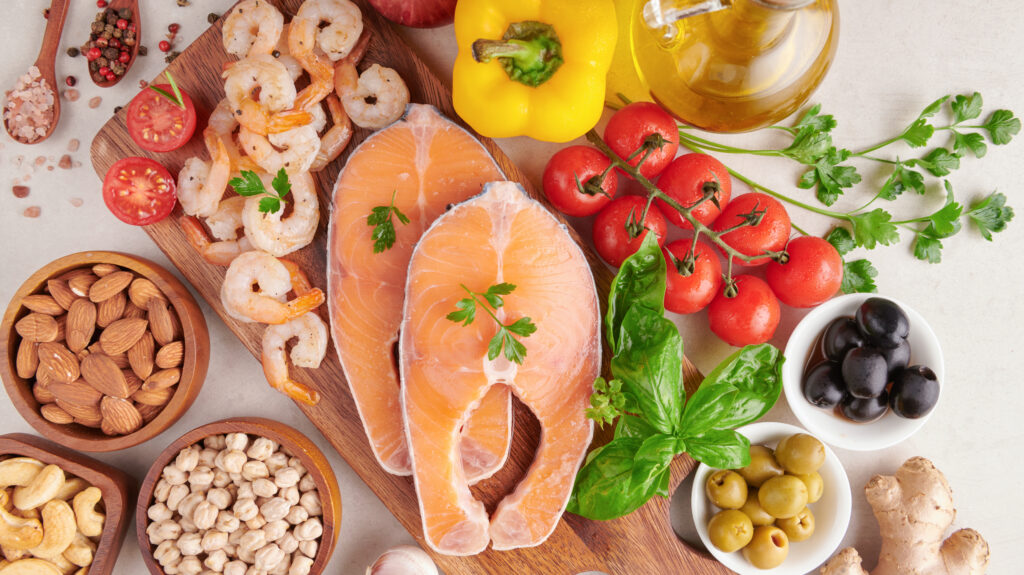Overview
Vitamins are playing a irreplaceable role in human body that taking the appropriate amount of vitamins every day will bring you lots of benefits. For example, vitamins can improve metabolic function, enhance immunity, protect bone, supply energy, etc., which are sourced from different types of vitamins.
To break down the types of vitamins, we can understand them from the perspective of fat solubility and water solubility. “Fat-soluble” refers to the certain vitamins are soluble in fats and oils, allowing them to stay in the body’s fat tissue and liver longer than water-soluble vitamins. On the contrary, water-soluble vitamins dissolve in water and are not stored in large amounts in the body. These vitamins are absorbed directly from the digestive tract into the bloodstream, and any excess is usually excreted in the urine and cannot be stored in the body.
Table of Contents
1. Fat Soluble Vitamins
2. Water Soluble Vitamins
3. Fat-soluble Vitamins VS. Water-soluble Vitamins
4. Is it good to take a multivitamin everyday?
5. Conclusion
Fat Soluble Vitamins
There are four main fat soluble vitamins which are Vitamin A, D, E and K. Find their functions and food sources will help your diet improvement.
| Vitamin Name | Functions | Food Source |
| Vitamin A (Retinol) | 1. Maintain healthy vision 2. Help cell growth 3. Promote wound healing 4. Support skin health | 1. Animal liver 2. Fish oils 3. Milk, cheese, butter 4. Eggs 5. Orange and yellow vegetables, dark leafy greens 6. Mangoes, apricots, and cantaloupe |
| Vitamin D (Calciferol) | 1. Promote calcium absorption 2. Maintain bone health 3. Reduce inflammation 4. Maintain muscle strength 5. Depression regulation | 1. Sunlight 2. Fatty Fish: Salmon, mackerel, sardine 3. Cod liver oil 4. Eggs, dairy products, orange juice, and cereals 5. Plant milks, mushrooms (especially those exposed to UV light) |
| Vitamin E (Tocopherol) | 1. Antioxidant 2. Reduce oxidation of immune cells 3. Reduce oxidative stress and UV damage 4. Maintain cardiovascular health | 1. Nuts and seeds 2. Sunflower, safflower, and wheat germ oil 3. Green leafy vegetables 4. Avocados and kiwi |
| Vitamin K1 (phylloquinone) & Vitamin K2 (Menaquinone) | 1. Improve blood coagulation function 2. Support osteocalcin synthesis 3. Reduce the risk of cardiovascular disease | K1: Green Leafy Vegetables, vegetable oils K2: Fermented food such as Natto (fermented soybeans), animal liver & meat, cheese, egg yolks |
Water Soluble Vitamins
Vitamin C and B vitamins are belong to water-soluble vitamins, each vitamin has a different effect on the human body.
| Vitamin Name | Functions | Food Source |
| Vitamin C (Ascorbic Acid) | 1. Antioxidant protection 2. Help collagen synthesis 3. Enhance white blood cell function 4. Fight infection 5. Enhance non-heme iron absorption 6. Tissue repair and wound healing | 1. Citrus fruits, strawberries, Kiwi 2. Bell peppers, Broccoli, Brussels sprouts |
| Vitamin B1 (Thiamine) | 1. Carbohydrate conversion 2. Serve as a coenzyme in glucose metabolism 3. Support nervous system health | 1. Whole grains 2. Nuts and seeds 3. Lean Pork 4. Trout, mussels, and tuna |
| Vitamin B2 (Riboflavin) | 1. Improve ATP conversion capacity and increase metabolism 2. Promote glutathione production and anti-oxidation 3. Enhance the essential for cell growth and repair | 1. Milk, yogurt, cheese 2. Egg yolk 3. Lean meats 4. Green Leafy Vegetables 5. Almonds, cereals |
| Vitamin B3 (Niacin) | 1. Participate as a coenzyme 2. DNA repair and stress response 3. Control cholesterol levels | 1. Chicken, turkey, beef, and pork 2. Tuna, salmon, and mackerel 3. Whole grains and legumes 4. Nuts and seeds |
| Vitamin B5 (Pantothenic Acid) | 1. Promote coenzyme A synthesis 2. Play a role in hormone synthesis 3. Maintain digestive tract health | 1. Chicken, beef, and eggs 2. Whole grains and legumes 3. Avocados, sweet potatoes, and broccoli 4. Mushrooms |
| Vitamin B6 (Pyridoxine) | 1. Promote amino acid metabolism 2. Hemoglobin production 3. Neurotransmitter and myelin synthesis 4. Produce antibodies and enhance immunity | 1. Chicken, turkey, beef, and pork 2. Salmon and tuna 3. Potatoes, spinach, and bell peppers 4. Nuts and seeds 5. Bananas and avocados 6. Legumes (chickpeas, lentils, and beans) |
| Vitamin B7 (Biotin) | 1. Promote energy metabolism 2. Regulate gene synthesis 3. Maintain skin, hair and nails health | 1. Egg yolk 2. Nuts and seeds, 3. Whole grains, legumes 4. Animal liver and kidney 5. Salmon and sardines 6. Sweet potatoes, spinach, and broccoli |
| Vitamin B9 (Folate/Folic Acid) | 1. DNA synthesis and repair 2. Prevent anemia 3. Benefit fetal development 4. Secretion of dopamine to regulate emotions | 1. Dark leafy greens 2. Legumes (Lentils, beans, and peas) 3. Citrus fruits 4. Avocados 5. Asparagus, brussels sprouts |
| Vitamin B12 (Cobalamin) | 1. Promote red blood cell formation and prevents anemia 2. Support fatty acid and amino acid metabolism 3. Maintain nerve health 4. DNA synthesis | 1. Beef, pork, lamb 2. Salmon, trout, tuna, and haddock 3. Egg yolk 4. Animal based milk, cheese, and yogurt 5. Soy, almond, oat milk |
Fat-soluble Vitamins VS. Water-soluble Vitamins
The main difference of two types of vitamins is in absorption and how they are stored in the human body. It’s important to learn whether a vitamin is water-soluble or fat-soluble, and understanding how a specific vitamin work can help you optimize your intake with optimized diets and habits.
| Vitamin Type | Pros | Cons |
| Fat-soluble Vitamins | 1. Long term store in liver and adipose tissue which enable energy supply when body lack of nutrition 2. Cooking will not destroy the structure of fat-soluble vitamins | 1. Have risk of toxicity on internal organs if take to much, may cause liver damage, hypercalcemia, etc. 2. Not easy to be excreted through human circulation, need control for taking amount |
| Water-soluble Vitamins | 1. Almost non-toxic, high intake generally does not cause toxicity 2. High rate of metabolism and rapid absorption by the human body | 1. Cannot be stored in the body and may cause vitamin deficiency if not taken in in time 2. Water soluble vitamins ill be destroyed by improper storage or cooking of foods |
Is it good to take a multivitamin everyday?
Based on the different characteristics of vitamins, compound fat-soluble or water-soluble vitamins are also one of the ways for people to supplement nutrients.
Combinations of fat-soluble vitamins usually include vitamins A, D, E and K. This type of compound vitamin is provided in the form of oil-based capsules or soft gels. In actual formulas, it is formulated with oils such as MCT (medium-chain triglycerides), fish oil or sunflower oil to help digestion and absorption of vitamins.
People with malabsorption can, to a certain extent, alleviate the symptoms caused by the lack of fat-soluble vitamins, such as Crohn’s disease, by taking this compound vitamin.
But whether to take fat-soluble multivitamins every day or not should be noted that we cannot take them blindly, because without knowing it, excessive intake will have a great impact on the body’s burden. Therefore, we need to consult a health care product expert and test our own intake.
Water-soluble multivitamins are supplements that contain B-complex group and vitamin C. The main purpose of taking water-soluble vitamins is to increase nutrition and supplement the ingredients that are easily lacking in the daily diet. Compared with fat-soluble vitamins, water-soluble vitamins are not easily stored in the body, so the risk of poisoning is much lower, but due to the possibility of resistance with other ingested ingredients, it is still necessary to consult a professional.
And one more important thing, is to choose trusted supplement brands, such as Garden of Life, Nordic Naturals, Carlson Labs, having the authoritative guarantee.

Conclusion
Both fat-soluble and water-soluble vitamins are necessary for human health, but they require different approaches to supplementation. Fat-soluble vitamins play an indispensable role in vision, bones, and blood coagulation. They are absorbed together with dietary fat and easily stored in the human liver. However, the side effects it may bring cannot be ignored, so it should be taken in moderation and follow the advice of professional health care professionals.
Water-soluble vitamins are used for human energy supplementation, immunity, and red blood cell production. Excessive intake will be excreted in the urine, so the possibility of poisoning is very small. However, the intake of any vitamin must be based on the body’s own nutritional needs and cannot be taken blindly.
SED Ingredients, as a leading ingredient supplier, provides you with vitamin ingredients with comprehensive qualifications. Professionally used in the production of raw materials for supplement products, with high purity and stable supply. Contact us now for more vitamin ingredients to improve your brand quality!

